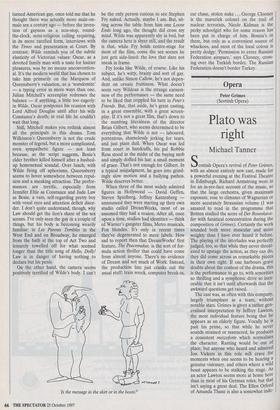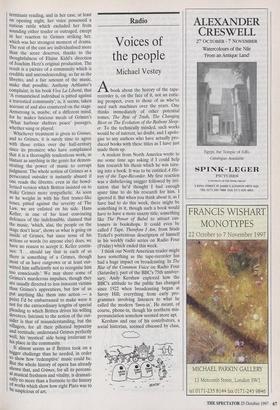Opera
Plato was right
Michael Tanner
Scottish Opera's revival of Peter Grimes, with an almost entirely new cast, made for a powerful evening at the Festival Theatre in Edinburgh. Richard Armstrong went in for an in-yer-face account of the music, so that the large orchestra, given maximum exposure, rose to climaxes of Wagnerian or more accurately Straussian volume (I was amazed to read in the programme that Britten studied the score of Der Rosenkava- Her with fanatical concentration during the composition of Grimes). Certainly the work sounded both more muscular and more weighty than I have ever heard it before. The playing of the interludes was perfectly judged, too, so that while they never threat- ened to upstage the action, as they can do, they did come across as remarkable pieces in their own right. If one harbours grave doubts about the content of the drama, this is the performance to go to, with sonorities so thrilling and a symphonic drive so inex- orable that it isn't until afterwards that the awkward questions get raised.
The cast was, as often with this company, largely triumphant as a team, without notable stars. Grimes is given a rather gen- eralised interpretation by Jeffrey Lawton, the most individual feature being that he appears as an elderly figure. Vocally he is past his prime, so that while he never sounds strained or mannered, he produces a consistent mezzoforte which normalises the character. Ranting would be out of place, but anyone who heard and admired Jon Vickers in this role will crave for moments when one seems to be hearing a genuine visionary, and others where a wild beast appears to be stalking the stage. As an actor Lawton seems more at home here than in most of his German roles, but that isn't saying a great deal. The Ellen Orford of Amanda Thane is also a somewhat inde- terminate reading, and in her case, at least on opening night, her voice possessed a curious rattle which excluded her from sounding either tender or outraged, except in her reaction to Grimes striking her, which was her strongest moment of drama. The rest of the cast are individualised more than the score deserves, thanks to the thoughtfulness of Elaine Kidd's direction of Joachim Herz's original production. The result is a picture of a community which is credible and uncondescending, so far as the libretto, and a fair amount of the music, make that possible. Anthony Arblaster's Complaint, in his book Viva La Liberia, that `A romanticised individual is pitted against a travestied community', is, it seems, taken account of and also countered on the stage. Armstrong is, maybe, of a different mind, for he makes luscious meals of Grimes's `What harbour shelters peace' passages, whether sung or played.
Whichever treatment is given to Grimes, and to Grimes, it is surely time to agree with those critics over the half-century since its premiere who have complained that it is a thoroughly tendentious work, as blatant as anything in the genre for demon- strating the power of music to corrupt judgment. The whole notion of Grimes as a persecuted outsider is instantly absurd if one reads the libretto, even in the bowd- lerised version which Britten insisted on to make Grimes more sympathetic. As soon as he weighs in with his first trance-like tones, pitted against the severity of The Law, we are enlisted on his side. Hans Keller, in one of his least convincing defences of the indefensible, claimed that the music, 'which, alas, the people on the stage don't hear', shows us what is going on inside of Grimes, but since none of his actions or words (to anyone else) does, we have no reason to accept it. Keller contin- ues: 'I ... should say that in each of us there is something of a Grimes, though most of us have outgrown or at least out- witted him sufficiently not to recognise him too consciously.' We may share some of Grimes's murderous impulses, though they are usually directed to less innocent victims than Grimes's apprentices, but few of us put anything like them into action — a Point I'd be embarrassed to make were it not for the extraordinary lengths of special pleading to which Britten drives his willing devotees. Intrinsic to the notion of the out- sider is that of misunderstanding, but the villagers, for all their pilloried hypocrisy and rectitude, understand Grimes perfectly well, his 'mystical' side being irrelevant to his place in the community. It almost seems as if Britten took on a bigger challenge than he needed, in order to show how 'redemptive' music could be. But the whole history of opera has already shown that, and Grimes, for all its perenni- al musical freshness and vitality, is dramati- cally no more than a footnote to the history of works which show how right Plato was to be suspicious of art.



















































































 Previous page
Previous page